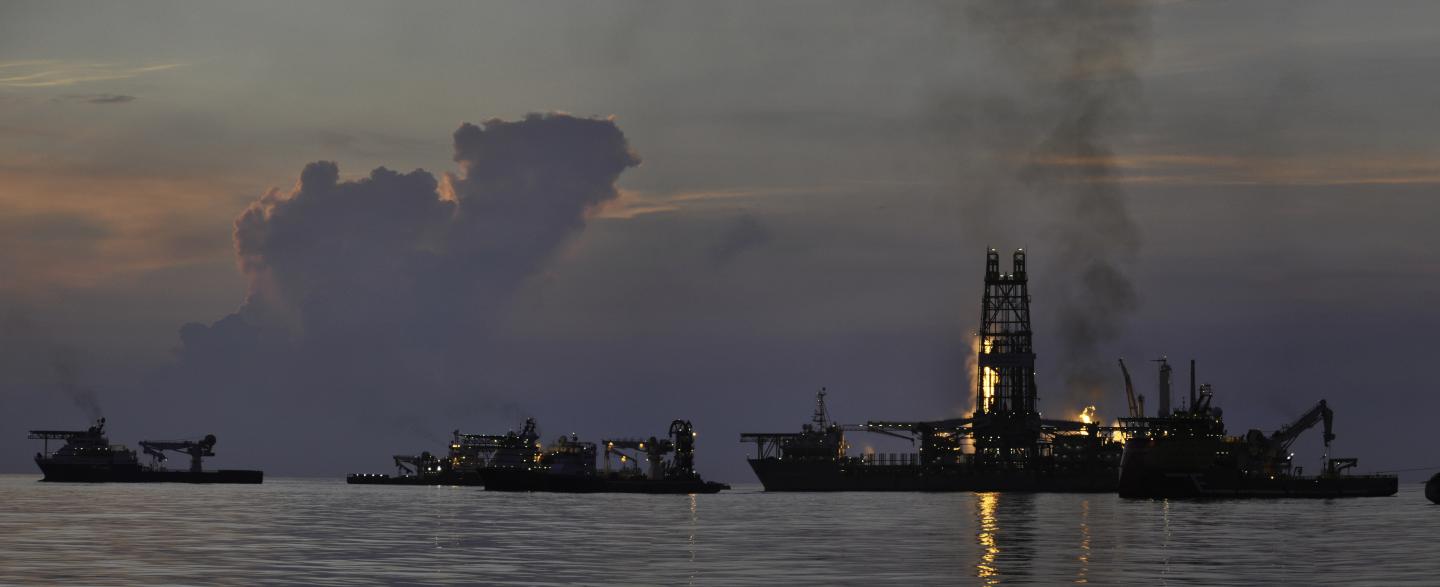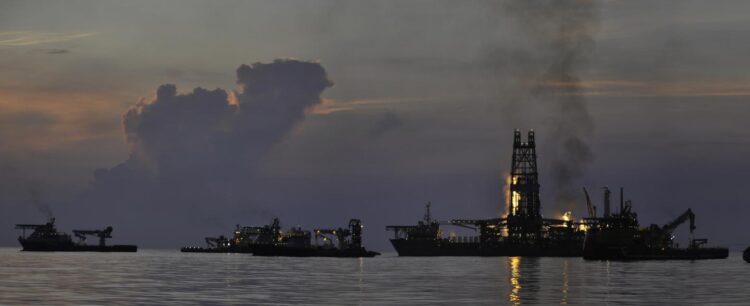Paper reviews major findings, technological advances that could help in next deep-sea spill.

Credit: (Photo by Cabell Davis, © Woods Hole Oceanographic Institution)
Ten years ago, a powerful explosion destroyed an oil rig in the Gulf of Mexico, killing 11 workers and injuring 17 others. Over a span of 87 days, the Deepwater Horizon well released an estimated 168 million gallons of oil and 45 million gallons of natural gas into the ocean, making it the largest accidental marine oil spill in history.
Researchers from Woods Hole Oceanographic Institution (WHOI) quickly mobilized to study the unprecedented oil spill, investigating its effects on the seafloor and deep-sea corals and tracking dispersants used to clean up the spill.
In a review paper published in the journal Nature Reviews Earth & Environment, WHOI marine geochemists Elizabeth Kujawinski and Christopher Reddy review what they– and their science colleagues from around the world–have learned from studying the spill over the past decade.
“So many lessons were learned during the Deepwater Horizon disaster that it seemed appropriate and timely to consider those lessons in the context of a review,” says Kujawinski. “We found that much good work had been done on oil weathering and oil degradation by microbes, with significant implications for future research and response activities.”
“At the end of the day, this oil spill was a huge experiment,” adds Reddy. “It shed great light on how nature responds to an uninvited guest. One of the big takeaways is that the oil doesn’t just float and hang around. A huge amount of oil that didn’t evaporate was pummeled by sunlight, changing its chemistry. That’s something that wasn’t seen before, so now we have insight into this process.”
Released for the first time in a deep ocean oil spill, chemical dispersants remain one of the most controversial debates in the aftermath of Deepwater Horizon. Studies offer conflicting conclusions about whether dispersants released in the deep sea reduced the amount of oil that reached the ocean surface, and the results are ambiguous about whether dispersants helped microbes break down the oil at all.
“I think the biggest unknowns still center on the impact of dispersants on oil distribution in seawater and their role in promoting–or inhibiting–microbial degradation of the spilled oil,” says Kujawinski, whose lab was the first to identify the chemical signature of the dispersants, making it possible to track in the marine environment.
Though the authors caution that the lessons learned from the Deepwater Horizon release may not be applicable to all spills, the review highlights advances in oil chemistry, microbiology, and technology that may be useful at other deep-sea drilling sites and shipping lanes in the Arctic. The authors call on the research community to work collaboratively to understand the complex environmental responses at play in cold climates, where the characteristics of oil are significantly different from the Gulf of Mexico.
“Now we have a better sense of what we need to know,” Kujawinski says. “Understanding what these environments look like in their natural state is really critical to understanding the impact of oil spill conditions.”
###
Additional authors of the review are chemist Ryan P. Rodgers (Florida State University), and microbiologists J. Cameron Thrash (University of Southern California, Los Angeles), David L. Valentine (University of California Santa Barbara), and Helen K. White (Haverford College).
Funding for this review was provided by the Gulf of Mexico Research Initiative, the Henry Dreyfus Teacher-Scholar Award, the National Academies of Science, Engineering, and Medicine Gulf Research Program, and the National Science Foundation.
Woods Hole Oceanographic Institution is a private, non-profit organization on Cape Cod, Mass., dedicated to marine research, engineering, and higher education. Established in 1930 on a recommendation from the National Academy of Sciences, its primary mission is to understand the ocean and its interaction with the Earth as a whole, and to communicate a basic understanding of the ocean’s role in the changing global environment. For more information, please visit http://www.
Key Takeaways
- Some coastal ecosystems around the Gulf of Mexico recovered, but in areas such as deep-sea coral communities, the oil, gas and dispersants combined with other stressors to create long-lasting impacts.
- Gene analysis tools, used on a wide scale for the first time, provided unprecedented insights into which microbes consumed oil, gas and dispersants in marine ecosystems.
- Advanced chemical analysis showed for the first time that weathering on the ocean surface, particularly by sunlight and oxygen (photo-oxidation), changed the composition of oil but reduced the effectiveness of dispersants applied to the surface.
- The spill science community can be most effective by working collaboratively across academia, industry and government in the event of future oil releases in the deep sea and high latitudes.
Media Contact
WHOI Media Office
[email protected]





